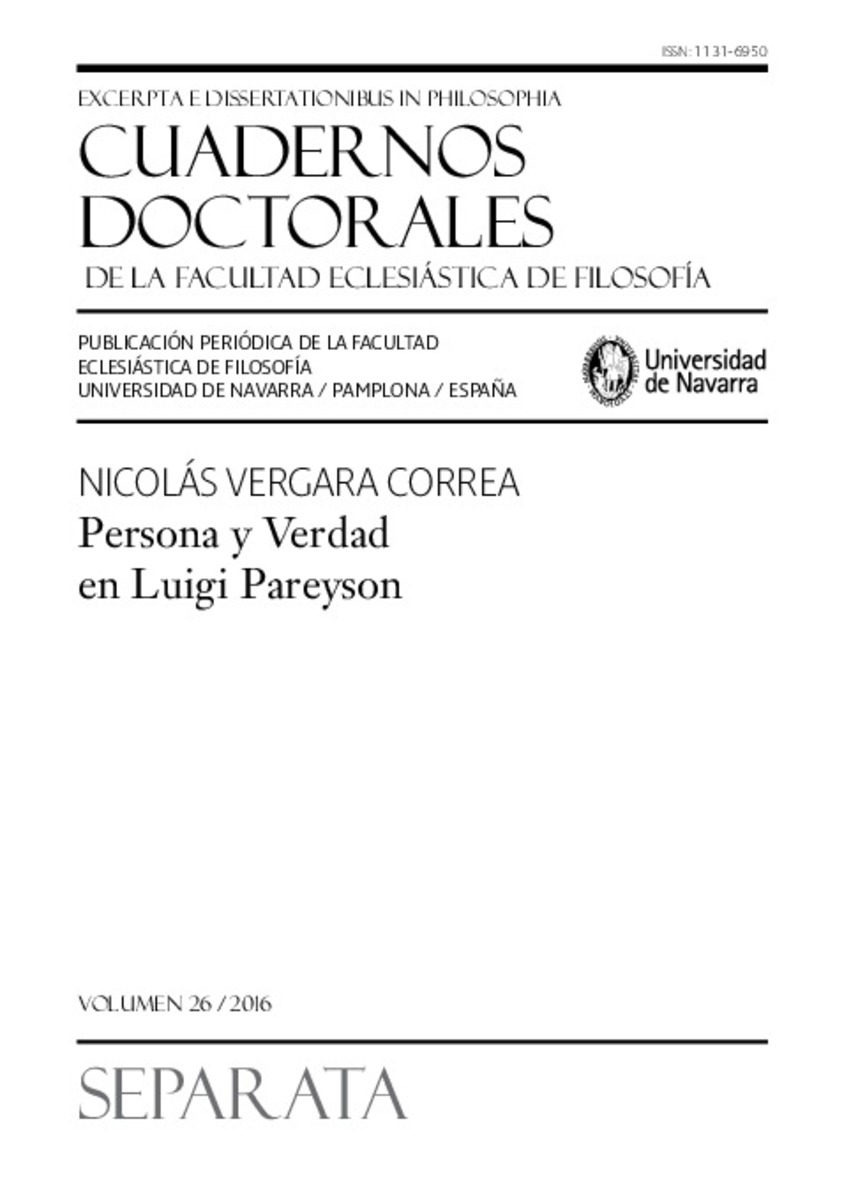Full metadata record
| DC Field | Value | Language |
|---|---|---|
| dc.contributor.advisor | Sánchez-Migallón, S. (Sergio) | - |
| dc.creator | Vergara, N. (Nicolás) | - |
| dc.date.accessioned | 2017-04-06T08:06:22Z | - |
| dc.date.available | 2017-04-06T08:06:22Z | - |
| dc.date.issued | 2016 | - |
| dc.date.submitted | 2016 | - |
| dc.identifier.citation | Vergara, N. (2016). Persona y Verdad en Luigi Pareyson. Cuadernos Doctorales de la Facultdad Eclesiástica de Filosofía, Vol 26, Nº 2, pp. 87-169 | es_ES |
| dc.identifier.issn | 1131-6950 | - |
| dc.identifier.uri | https://hdl.handle.net/10171/43231 | - |
| dc.description.abstract | Al constatarse las falencias de la filosofía de Hegel, surgieron corriente existencialistas que intentaron rescatar el valor del individuo, cayendo, sin embargo, en un intimismo de la verdad. Luigi Pareyson, en el siglo veinte, propone un personalismo ontológico abierto al ser, a la verdad y a la trascendencia; es decir, una filosofía personal anclada en una verdad perenne, comprensible a los individuos de cualquier cultura. Como pensador cristiano, subraya la capacidad del cristianismo de informar y revitalizar la cultura de cualquier época, por enraizarse en una verdad perpetuamente válida y actual. Su existencialismo intenta resolver la relación entre finito e infinito, entre Dios y el hombre, corrigiendo los planteamientos de los pensadores que sucedieron a Hegel (Kierkegaard, Feuerbach, Barth y Heidegger, entre otros). En efecto, algunos filósofos exaltaron el infinito en desmedro de la iniciativa humana y de la libertad, o bien concibieron al hombre como cerrado a la trascendencia. Pareyson propone una filosofía abierta a la trascendencia y respetuosa de la libertad y de la iniciativa. La novedad de su existencialismo radica en interpretar la experiencia de la trascendencia en clave religiosa: Dios se revela a quien lo busca, y depende de la libertad humana el acoger la luz divina o permanecer en la oscuridad. Comprendió que la persona es el órgano revelador de la verdad; es decir, es a la persona a quien la verdad del ser se le manifiesta, y el individuo la acoge libremente. Su teoría hermenéutica fue pionera en el siglo pasado, abriendo camino a nuevas investigaciones y escuelas de pensamiento. | es_ES |
| dc.description.abstract | Noting the shortcomings of Hegel’s philosophy, existentialist currents tried to rescue the value of the individual, falling, however, in an intimacy of truth. Luigi Pareyson, in the twentieth century, proposes an ontological personalism open to truth and transcendence, that is, a personalist philosophy anchored in a perennial truth, understandable for individuals of any culture. As a Christian thinker, he underlines the capacity of Christianity to inform and revitalize the culture of any time, by being rooted in a perpetually valid and present truth. His existentialism attempts to resolve the relation between finite and infinite, between God and man, correcting the ideas of the thinkers who followed Hegel (Kierkegaard, Feuerbach, Barth and Heidegger, among others). Indeed, some philosophers extolled the infinite at the expense of human initiative and freedom, either conceived man as closed to transcendence. Pareyson proposes a philosophy opened to transcendence and respectful of freedom and initiative. The novelty of his existentialism lies in interpreting the experience of transcendence in a religious key: God is revealed to those who seek Him, and accepting the divine light, or remaining in the dark, depends on human freedom. He realized that the person is the organ which reveals the truth; that is, the one to whom the truth of being is made manifest and who accepts it freely. His hermeneutics pioneered early last century, paving the way for new investigations and schools of thought. | es_ES |
| dc.language.iso | spa | es_ES |
| dc.rights | info:eu-repo/semantics/openAccess | es_ES |
| dc.subject | Personalismo | es_ES |
| dc.subject | Interpretación, | es_ES |
| dc.subject | Verdad | es_ES |
| dc.title | Persona y Verdad en Luigi Pareyson | es_ES |
| dc.type | info:eu-repo/semantics/article | es_ES |
Files in This Item:
Statistics and impact
Items in Dadun are protected by copyright, with all rights reserved, unless otherwise indicated.






